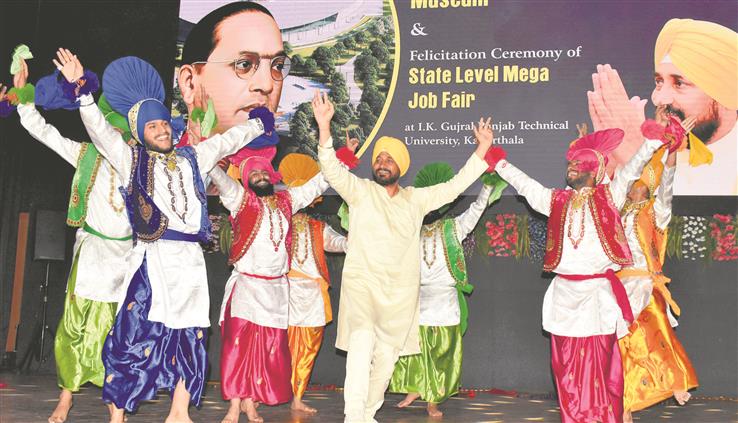
Charanjit Singh Channi’s elevation is being seen as an interesting moment in Punjab’s history, indicating that the ground could be changing. But there are voices within the community who raise moot points about whether symbolism alone can yield desired social outcomes for marginalised sections. Tribune Photo: Malkiat Singh
Aditi Tandon
It is a peculiar coincidence that Charanjit Singh Channi (58) was born in Ropar, also the birthplace of Kanshi Ram, widely acknowledged as the most influential Scheduled Caste leader of India after Dr BR Ambedkar.
But unlike Kanshi Ram, whose political grounding began in Pune where he had gone to work after completing his education in Punjab, Channi’s rise to the post of Punjab Chief Minister — the first from a Scheduled Caste — stems from his grassroots work in the state as municipal councillor, municipal council chairman, MLA and eventually minister.
By virtue of his prolonged political acclimatisation and impressive educational attainment (he is a law graduate, an MBA and is pursuing PhD from Panjab University, Chandigarh), Punjab’s first SC Chief Minister represents a new-age leadership with the potential to signal the pre-eminence of merit in an era of caste politics.
But the question is, whether the Congress party’s “bold” move will be viewed solely from the prism of symbolism, or will it transcend to a national discourse where the journey of disadvantaged SCs becomes as important as their destination.
Prof Surinder Jodhka, who heads the Centre for the Study of Social Systems at Jawaharlal Nehru University, says symbols cannot be taken lightly. “Political symbolism itself is very significant. The ideological facades that political parties build are important. With the appointment of Channi as CM, SCs are feeling elated. This has added to their sense of self in a Jat Sikh-dominated land. The CM, a rooted politician, has a chance to provide a new vision to the SC middle class,” says Jodhka, who follows the social life of castes in contemporary India.
For the Congress, the appointment is a clear gamble considering political terms in Punjab have traditionally been dictated by Jat Sikhs, who comprise 21 per cent of the state’s population and control the agrarian economy.
Rahul Gandhi’s decision, which expectedly riled the BJP, Akali Dal-BSP and AAP, is rooted as much in Congress’ electoral calculations in Punjab (SCs have historically supported the party, but the vote share has been depleting) as by the former party president’s stated plan to nurture national-level SC leadership.
Channi’s appointment fits into the Congress’ ongoing emphasis on SC projection. Earlier this year, the party named veteran SC leader Mallikarjun Kharge as Leader of Opposition in the Rajya Sabha even after he lost the Lok Sabha election. Kharge led the Congress in the 16th Lok Sabha earlier.
In 2019, when constituents of Maharashtra’s newly formed Maha Vikas Aghadi decided to nominate two ministers each for the first oath-taking, the Congress handpicked state chief Balasaheb Thorat and AICC’s SC department chief Nitin Raut. Politically, too, Rahul Gandhi and AICC general secretary Priyanka Vadra have actively associated with SC issues, agitating against sexual assaults on SCs in Hathras (UP) and Delhi Cantonment recently, and earlier leading the campaign in the Rohith Vemula case.
The signalling is evident as parties nationally vie for the SC pie, with the BJP claiming to have the maximum SC Members of Parliament.
In Punjab, Jodhka says, the Congress gamble on Channi may work. Describing his elevation as an interesting moment in Punjab’s history, the expert notes that the ground in the state is changing and time is ripe for experiments.
“Channi and Navjot Singh Sidhu are like political entrepreneurs, unlike political patriarchs Darbara Singh, Amarinder Singh and Parkash Singh Badal. The ground in Punjab is changing. The actual data of employment in agriculture shows the number employed in cultivation in Punjab is much less than thought,” notes Jodhka, sharing statistics that the proportion of people registered as cultivators is nearly 50 per cent in rural Punjab and 25 per cent in the state as a whole — indications of a declining agrarian economy, which has political implications for Jat Sikhs.
With democracy of a new kind emerging in Punjab and old hegemonies fading, CM Channi can seize the moment to meet the Congress’ aspirations of winning over SCs beyond Punjab, but the success of the gamble will reveal itself only at a later time.
Meanwhile, a cross-section of community members says the nomination of Channi as CM is celebratory enough as it adds to the community’s collective sense of pride.
Meena Kotwal, who founded the web portal Mook Nayak this year to track growing atrocities on SCs, asks why Channi’s elevation should not be hailed as empowering in times of caste-based lynching with SCs as specific targets. “We should feel sorry it has taken so long for Punjab, which has the highest proportion of SCs in its population across India, to have a CM from the community. The Congress has set an agenda. Why did the NDA not appoint SC Chief Ministers? They are in power in nearly 17 states,” Kotwal asks, adding that she had to launch Mook Nayak to articulate SC voices because her leaders didn’t care.
BSP chief Mayawati’s sagging political fortunes fit into this debate, with experts attributing her fall to flailing ideological commitments. A four-term Uttar Pradesh Chief Minister who inherited Kanshi Ram’s legacy is now hoping to strike a chord with Punjab’s SCs having allied with the Shiromani Akali Dal. The combine has promised an SC Deputy CM like the AAP.
But political observers don’t see much hope for Mayawati.
Hemlata Mahishwar of the Akhil Bharatiya Dalit Lekhika Manch says Mayawati’s support base hasn’t dwindled without reason. “She hardly comments on SC exploitation but makes it a point to publicly woo Brahmins. Her intentions are doubtful. SC Members of Parliament don’t help the cause of community empowerment because they barely articulate the voice of their people. They in fact join the very voices that exploit them. These questions are critical to the debate on SC empowerment,” Mahishwar says.
Changing the narrative
Currently Professor, Hindi Department, Jamia Millia Islamia, Mahishwar questions the celebratory mood over Channi’s appointment.
“In the 75th year of India’s Independence, we are being told to celebrate a CM from the SC community. Does this not raise question marks on our evolution as a democracy? The question is whether Channi has any merit other than his caste to get where he got. The very fact that so much attention is being paid to SC symbolism means we have kept the community deprived for decades so that we could play a certain kind of politics. Those taking credit for projecting SCs must introspect where we stand as a modern democracy,” the expert says, raising moot points about whether symbolism alone can yield desired social outcomes for marginalised sections even though it may deliver short-term electoral dividends.
History testifies that Ambedkar, India’s tallest SC ideologue and the country’s first Law Minister, did not need symbols to influence society and steer reforms.
As Jodhka says in his paper, ‘Kanshi Ram and the Making of the Dalit Political Agency’, “Ambedkar’s influence on contemporary Dalit lives in India goes far beyond the sphere of electoral mobilisations and continues to shape and inspire a wide variety of social, religious and political movements across the subcontinent. Given his pioneering struggles and educational achievements, he has also come to be very widely recognised as an important thinker of modern India, far beyond the Dalit universe, who provided a powerful and critical perspective on Indian society.”
In fact, more than symbols, it was the Constitution that gave the SCs a level-playing field to seek dignity and substantive citizenship.
Researchers say India needs fresh thinking on empowerment if political representation — as is being argued in Channi’s case — is indeed to serve as a tool for social transformation.
Mahishwar explains, “If we continue to view political appointments from the prism of symbolism, we will only be aiding the historical perpetuation of caste politics. We must break free from parochial perspectives and consider a leader’s individual capacity to deliver rather than his caste alone. We must see how one SC leader despite starting on an unequal footing in society leveraged constitutional guarantees and overcame prejudices to become CM. That narrative is the need of the hour.”
Mahishwar’s thought finds resonance among emerging aspirational SC and OBC classes. A cross-section of achievers from these communities did not wish to dwell on caste. Sushil Kumar, the first ‘Kaun Banega Crorepati’ contestant to win Rs5 crore in 2011, hails from Bihar and has lived the realities of caste, but wants to be identified as an equal. He says the Congress’ symbolism in Punjab will definitely have a positive impact in times when the general perception is that the ruling BJP is preferential towards Savarnas, although discrimination in the delivery of government schemes has diminished largely.
“Even so, the caste complex is psychological. It can’t be explained, this sense of being unequal. So when a leader from the community is projected, euphoria is natural because the community’s sense of self-worth gets reinforced. How long this lasts is anybody’s guess,” says Kumar, hoping the CM will deliver.
The Congress for its part says Channi’s projection is part of Rahul Gandhi’s mission to groom SC leaders under the plan that acknowledges “SC leaders equals SC voice”. Gandhi’s political strategy is to reach out to SCs beyond Punjab in poll-bound Uttar Pradesh, Uttarakhand and elsewhere.
Experts feel the road to SC empowerment will remain tough despite momentary symbolism by parties. Kanshi Ram’s slogan “Jiski jitni sankhya bhaari, uski utni hissedaari” was given in the 1980s, and yet, the inequities are stark, change slow.
CRITICAL COUNT
- Out of the Congress’ 77 MLAs in the 2017 Assembly elections, the maximum, 23, were SCs, who have 34 segments reserved in the 117-member Assembly.
- As per the 2011 census, Punjab has 88.6 lakh SCs, which amounts to 31.9 per cent of its population. Of these, the highest proportion, 19.4 per cent, is of SC Sikhs (CM Channi is an SC Sikh), 12.4 per cent SC Hindus, 0.98 per cent SC Buddhists.
- SC sub-castes in Punjab include 26.33 per cent Mazhabis, 20.7 per cent Ravidasias and Ramdasias (CM Channi’s community), 10 per cent Ad-dharmis and 8.6 per cent are Valmikis.
- Although the Congress has historically bagged a fair share of the SC Sikh vote in Punjab (33 per cent in 2002, 49 per cent in 2007, 51 per cent in 2012 and 41 per cent in 2017), it was alarmed by a 10 per cent drop between the previous two elections though the party retained SC Hindu support base, winning the corresponding elections with 47 per cent, 56 per cent, 37 per cent and 43 per cent of their votes.
- Even nationally, the Congress and partners need to boost SC vote share, which was roughly 26 per cent in the 2019 General Election against the NDA’s 41 per cent.
Source: Lokniti Survey, The Centre for Study of Developing Societies
SC Chief Ministers
- Damodaram Sanjivayya (1960–1962), AP | Cong
- Bhola Paswan Shastri (March 22–June 29, 1968; June 22–July 4, 1969; June 2, 1971–January 9, 1972), Bihar | Cong
- Ram Sundar Das (April 21, 1979–Feb 17, 1980), Bihar | JD(U)
- Jagannath Pahadia (1980–1981), Rajasthan | Cong
- Mayawati (1995, 1997, 2002– 2003, 2007–2012), UP | BSP
- Sushilkumar Shinde (2003– 2004), Maharashtra | Cong
- Jitan Ram Manjhi (May 20, 2014–Feb 20, 2015), Bihar | JD(U)
- Charanjit Singh Channi (Sept 20, 2021- ), Punjab | Cong
Join Whatsapp Channel of The Tribune for latest updates.



























